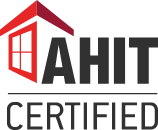
- Book your home inspection online today and save $25 on your next inspection! BOOK NOW!
-
 (347) 286-8696
(347) 286-8696  clientcare@csicertified.com
clientcare@csicertified.com
 (347) 286-8696
(347) 286-8696  clientcare@csicertified.com
clientcare@csicertified.com
By Admin Wednesday November 29, 2023
Radon is a topic that often shrouds itself in mystery and misconceptions. In this article, we’re here to shed some light on the most common myths and provide facts about radon.
Myth: Many people mistakenly believe that radon is harmless, considering it is another benign gas in the atmosphere.
Fact: However, the truth is far from it. Radon is a silent, invisible killer lurking in your home. It’s an odorless, tasteless, and colorless radioactive gas that seeps up from the ground and can accumulate indoors. Prolonged exposure to high radon levels significantly increases the risk of lung cancer. Radon exposure is the second leading cause of lung cancer deaths, right behind smoking. This is a fact that can’t be emphasized enough. Radon is not something to take lightly; it poses a severe health risk, and it’s crucial to take it seriously.
Myth: Some homeowners fear that radon testing is costly and time-consuming, causing them to put it off.
Fact: Fortunately, home radon testing is relatively inexpensive. Various methods are available for radon testing, and many are pretty affordable. Some tests can even provide quick results in as little as 48 hours. Many companies offer cost-effective professional home inspection services, and after all, the cost of testing is a small investment compared to the risk of developing lung cancer and other health risks associated with radon exposure. It’s a straightforward process that is easily incorporated into your routine home maintenance.
Myth: Some believe that simply ventilating their homes by opening windows and doors during radon testing will decrease the radon levels to safe limits.
Fact: While ventilation can help reduce radon levels temporarily, there are better solutions than this. Radon enters homes through various pathways, including cracks in the foundation, gaps around pipes, and other entry points. These entry points are often the primary sources of radon infiltration. To effectively mitigate radon levels, a more comprehensive approach is required. This typically involves sealing these entry points and installing a radon mitigation system, such as a vent pipe with a fan, to expel radon gas safely away from home.
Myth: Some homeowners believe that radon issues can’t be resolved in all types of homes or that radon mitigation systems or efforts are excessively costly or intrusive.
Fact: The reality is that radon problems can be addressed in most homes, regardless of their size or construction. With the proper mitigation system and professional expertise, it’s possible to reduce radon levels to safe levels in the majority of houses. Mitigation methods can be tailored to suit various building structures, and certified radon professionals can assess your home’s unique circumstances to devise an effective solution. The health and safety of your family are paramount, and radon mitigation is a proactive step you can take to safeguard them.
Myth: Some individuals believe that radon is only present in the basement or lower levels of a home and doesn’t affect upper floors.
Fact: While it’s true that radon often enters homes through the foundation, it can disperse and rise throughout the entire living space. Radon is not limited to the basement; it can infiltrate any part of your home, including the upper floors. In fact, radon in your home can sometimes be more concentrated on higher levels due to factors like stack effect and ventilation patterns. Therefore, it’s essential to test all levels of your home for radon to assess the risk accurately.
Myth: Some homeowners believe that only specific types of homes or regions with high geological radon levels need to worry about radon gas.
Fact: Radon can be a concern in any home, regardless of its construction or location. While the risk of radon reduction may vary depending on factors such as geological composition and ventilation, no home is entirely immune to radon intrusion. Radon levels can fluctuate widely, even within the same neighborhood. The only way to know if your home has elevated radon levels is to conduct testing. It’s a simple and relatively inexpensive process that can provide peace of mind regardless of your home’s characteristics.
Myth: Some homeowners may believe that they need to test their tap water for radon, assuming that it’s a common source of radon exposure.
Fact: While the radon concentrations in drinking water can be a concern in specific areas, it’s not a universal issue for all homeowners. Waterborne radon is more prevalent in certain geological regions where radon is naturally present in groundwater. Before conducting a water radon test, you must check with local authorities or conduct a radon risk assessment to determine if it’s relevant in your area. If necessary, specialized water radon tests can be performed to assess your water supply’s radon levels.
Myth: Some homeowners fear that selling a home with a history of radon mitigation or elevated radon levels will be challenging.
Fact: While it’s true that radon testing and mitigation may affect a home’s value, it doesn’t necessarily make it difficult to sell. In fact, many homebuyers appreciate knowing that a home has undergone radon testing and mitigation, as it demonstrates the seller’s commitment to a safe living environment. When properly addressed, Radon issues can be a selling point rather than a deterrent. Be transparent about any past radon mitigation efforts and provide potential buyers with documentation and test results to instill confidence in your home’s safety.
Understanding these additional radon myths and facts empowers homeowners to make informed decisions about testing and mitigation. Radon awareness is crucial for maintaining a healthy home environment, and debunking these misconceptions helps ensure your family’s safety.






Reach out to us upon putting an offer on a new home. We will connect with you at our earliest to schedule a date for the home inspection and discuss your requirements. If we are unable to schedule an inspection on your preferred date, we’ll work out to pick another available date at your convenience.
For any inquiries or concerns regarding the inspection, please feel free to contact us. We’ll be ready to address all your concerns.
TEL : (347) 286-8696

Clear Sight Inspections is a veteran-owned company. We aren't afraid of a little hard work, and we are willing to put in the effort no matter the circumstances. Through our home inspection services, we continue to serve our community and put that experience to work for you.